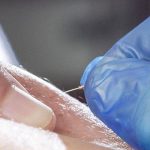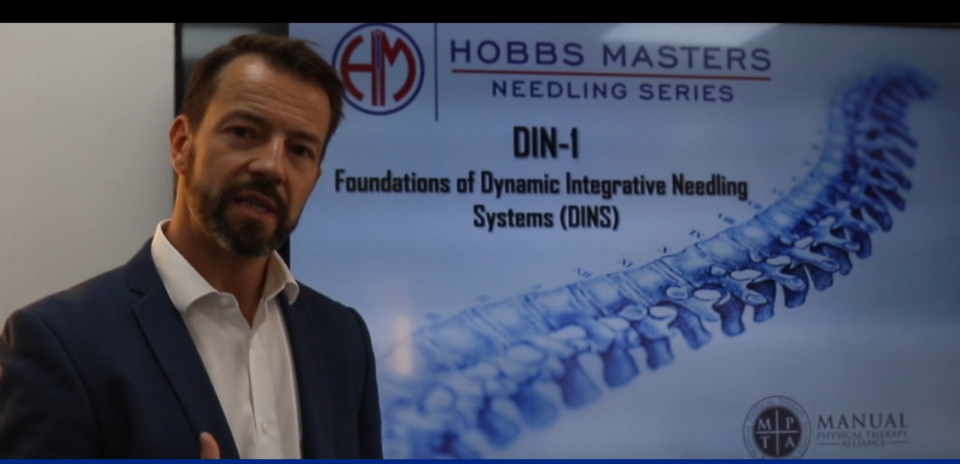The seminar is only addressed to Physiotherapists and Health Professionals.
Course’s language is English with simultaneous translation to Greek.
LLLC, EPIMORFOSIS intends to organize a Dry Needling – Level 1 – THESSALONIKI seminar, with professor Jonathan Hobbs.
The seminar lasts 3 days and will be held in Thessaloniki.
The cost of the seminar amounts to 430€.
The amount of 150€ must be prepaid for the finalization of the participation.
The remaining amount of 280€ must be deposited at least 2 days before the beginning of the seminar.
Hobbs Masters Needling System:
Dry Needling Level 1
DIN-1 Foundations of Dynamic Integrative Needling
Aims of the programme
1.To develop participant’s knowledge and understanding of dry needling.
2.To develop participant’s skills in clinical reasoning and critical and analytical problem-based learning in relation to dry needling.
3.To develop participant’s competence in applying their clinical skills to the practice of dry needling.
4.To effectively integrate dry needling skills into the manual skills of the manual therapist.
5.To develop participant’s interpersonal skills in relation to dry needling practice in the clinical setting
Assessed learning outcomes of the programme
By the end of the course the participant will be expected to be able to:
1.Demonstrate the practical skills, qualities and other attributes required for the safe application of dry needling. These techniques and practices should be demonstrated in accordance with health and safety regulations within the scope of manual therapy professional practices taking into account an understanding and appreciation of the related practical precautions and contra-indications involved.
2.Demonstrate an understanding of the specific and non-specific effects of dry needling taking into account relevant anatomical, physiological, microbiological and pathological principles with reference to the current best available evidence.
3.Demonstrate how dry needling can be safely and effectively integrated within manual therapy practice in the therapeutic management of conditions of musculoskeletal pain and dysfunction.
Knowledge and Understanding (Learning outcomes; 1, 2, 3)
Cognitive/intellectual skills (Learning outcomes; 1, 2, 3)
Practical Skills (Learning outcomes; 1, 2, 3)
Assessment Mode:
Formative.
Practical skills competency test (Learning outcomes; 1, 2, 3)
Indicative content
These outcomes will be achieved through a variety of teaching strategies including lectures, tutorials, seminars, action groups, problem-based learning scenarios, clinical reasoning based case studies, presentations and practical needling situations. Learning will also be supported by the course study manual and the use of research-based teaching materials and methods.
The programme will explore content in the following areas:
• Examining the evidence-base,
• Integration of anatomy, physiology, microbiology and pathology
• Integration within physiotherapy clinical reasoning
• Needling skills
• Location of points
• Safety
• Background of dry needling
• Medical needling/dry needling techniques
Programme Content
• History of dry needling
• Concepts of dry needling
• Medical needling concepts
• Neurophysiology of dry needling
• Trigger point theory and needling
• Health and safety: Precautions and contraindication
• Needling techniques
• Point location
• Point selection criteria
• Assessment
• Needle competency test with evaluation of safe practice
On the successful completion of the foundation module a certificate of competence will be issued to each delegate subject to observation of their safe and competent practical needling skills. They will then be eligible to attend the advanced module. With successful completion of the advanced module delegates will then be issued with a certificate of advanced dry needling practitioner.
Watch the video:
Day 1
12:00 – 12:30 Registrations
12:30 – 12:45 Introductions and initial briefing of course outline and structure.
12:45- 14:00 History of dry needling and its role within western medicine. Developing knowledge and understanding of the principles and philosophies underlying the use of dry needling in clinical practice. Current developments in the practice or theory of dry needling.
14:00 – 14:15 Comfort break
14:15 – 15:00 Neurophysiology and “Pain Gate” theory. Knowledge and understanding of relevant anatomical, physiological, microbiological and pathological principles related to dry needling.
15:00 – 16:00 The pathophysiology of trigger points.
Knowledge and understanding of relevant anatomical, physiological, microbiological and pathological principles related to dry needling.
16:00 – 16:45 Lunch
16:45 – 17:45 Principles of needling and point location and practical needling techniques.Knowledge and understanding of relevant anatomical, physiological, microbiological and pathological principles related to dry needling.
17:45 – 18:45 Health & Safety in clinical practice.
The legislative and professional standards and codes of practice guiding the practice of dry needling. Ensuring the appreciation of and adherence to the contra-indications and precautions for the application of dry needling.
18:45 – 19:00 Comfort break
19:00 – 20:15 Needling gluteal, lateral hip rotators and the lower leg muscles.
Developing the skills, qualities and other attributes in techniques and practice in dry needling within the Health and Safety regulations and within the scope of professional practice.
20:15 – 20:30 Review Day
Day 2
09:00-09:15 Review of Day 1
09:15-10:30 Needling cervical and shoulder muscles.
Developing the skills, qualities and other attributes in techniques and practice in dry needling within the Health and Safety regulations and within the scope of professional practice.
10:30-10:45 Comfort break
10:45-12:30 Needling shoulder muscles.
Developing the skills, qualities and other attributes in techniques and practice in dry needling within the Health and safety regulations and within the scope of professional practice.
12:30-13:15 Lunch
13.15-15:15 Needling thoracic muscles.
Developing the skills, qualities and other attributes in techniques and practice in dry needling within the Health and Safety regulations and within the scope of professional practice.
15:15-15:30 Comfort break
15:30-16:45 Needling competency test
Developing knowledge and understanding of the principles and philosophies underlying the use of dry needling in clinical practice. Developing the skills, qualities and other attributes in techniques and practice in dry needling within the Health and Safety regulations and within the scope of professional practice.
16:45-17:00 Review Module
Day 3
09:00-09:15 Review of Day 2
09:15-09:30 Needling lumbar and lower limb muscles.
Developing the skills, qualities and other attributes in techniques and practice in dry needling within the Health and Safety regulations and within the scope of professional practice.
09:30-10:30 Needling lumbar and lower limb muscles.
Developing the skills, qualities and other attributes in techniques and practice in dry needling within the Health and Safety regulations and within the scope of professional practice.
10:30-10:45 Comfort break
10:45-12:30 Needling lumbar and lower limb muscles.
Developing the skills, qualities and other attributes in techniques and practice in dry needling within the Health and Safety regulations and within the scope of professional practice.
12:30-13:15 Lunch
13.15-15:15 Needling lumbar and lower limb muscles.
Developing the skills, qualities and other attributes in techniques and practice in dry needling within the Health and Safety regulations and within the scope of professional practice.
15:15-15:30 Comfort break
15:30-16:45 Needling lumbar and lower limb muscles.
Developing the skills, qualities and other attributes in techniques and practice in dry needling within the Health and Safety regulations and within the scope of professional practice.
16:45-17:15 Needling cervical and upper limb muscles.
Developing the skills, qualities and other attributes in techniques and practice in dry needling within the Health and Safety regulations and within the scope of professional practice.
17:15-17:30 Review day
1. Credit or Deposit card payment
You can deposit the down payment or the total fee via credit or deposit card (Visa, Mastercard & American Express) from the webpage of each course, through VivaPayments.
You are solely responsible for the proper entry and the genuineness of your credit/deposit card’s details. EPIMORFOSIS bears no responsibility in case of any error.
Any payment commission is charged to EPIMORFOSIS
2. Deposit – Transfer to our bank account.
You can deposit or transfer the requested amount for your registration to the following accounts, writing your full name in the field “Reason for the Beneficiary”:
PIRAEUS BANK:
ΙΒΑΝ: GR5501722380005238070348955
SWIFT(BIC): PIRBGRAA
NATIONAL BANK of GREECE:
IBAN: GR6801102170000021744103439
SWIFT(BIC): ETHNGRAA
ALPHA BANK :
ΙΒΑΝ: GR4801407080708002002013410
SWIFT(BIC): CRBAGRAA
EUROBANK:
ΙΒΑΝ: GR4502600370000010201090153
SWIFT(BIC): ERBKGRAA
Beneficiary: EPIMORFOSIS KENTRO EPIMORFOSIS STELECHON YGEIAS OE
The bank transfer fee charged to EPIMORFOSIS
1. A certificate of attendance, a degree or a diploma will be issued.
2. Printed handouts are provided (notes or relevant book).
3. In case of cancellation of the seminar due to EPIMORFOSIS’s responsibility, deposited fees will be refunded immediately.
4. EPIMORFOSIS reserves the right to change the date or postopone seminars, informing participants by phone and / or sms & e-mail. In such a case participants are entitled to request full refund of their fees if they do not wish to attend the seminar on the new date or to use this amount for their participation in other seminars or services of the company.
5. In the event of a strike, government’s bans, heavy bad weather, and generally any event beyond the reasonable control of the organisers which impedes the execution of part or all of the seminar, the organizers reserve the right to change the date and time of the event. In this case the fees are not refundable but are valid as they are.
6. Cancellation of participation due to participant’s responsibility is possible only by email, as follows:
• up to 30 days prior to the start of the seminar, all deposits are refundable.
• up to 15 days prior to the start of the seminar, 50% is refundable.
• no refund after this deadline, exceptions could be only by decision of EPIMORFOSIS.
7. The realisation of the course will be confirmed by email or/and sms to be sent to participants, in time.
8. It is advised to not buy your flight tickets until you receive this confirmation email (or/and sms).
9. LLC-1 EPIMORFOSIS keeps the right to change course venues.


Σεμινάριο Ξηρής Βελόνας (Dry Needling – Level 1) – by Jonathan Hobbs – ΘΕΣΣΑΛΟΝΙΚΗ 2025
€150.00 – €430.00
Training, a steady value for more than twenty years now, leads physiotherapy and keeps it at a very high level, well done to George Karambalis and his associates, we owe a lot to all of you.
EPIMORFOSIS organizes specialization seminars for rehabilitation professionals. I’ve watched a lot. I strongly recommend you trust EPIMORFOSIS for your specialization and lifelong information.
EPIMORFOSIS justifies its name by providing high quality courses. George Karampalis operates more like a constant “trainee” and less like an entrepreneur, and this is an additional positive fact in the effort that is put by the workers and teachers of EPIMORFOSIS.
I have known George Karampalis and EPIMORFOSIS for many years. I’ve had the opportunity to join several clinical courses and I can argue that, at the level of organisation and selection of trainers, they have a high level of recognised prestige.
My first steps in professional specialization started with EPIMORFOSIS and continue. It has been with us all these years, covering the need for modern and documented knowledge, in collaboration with internationally acclaimed educational institutions.
The best physiotherapists training institution. It enables the development of the necessary knowledge for clinical reasoning. High-quality training without having to travel abroad.



